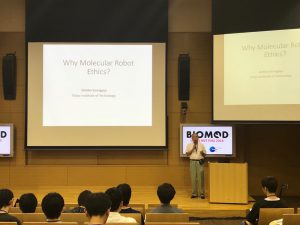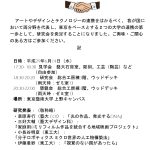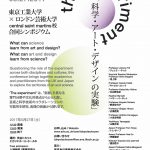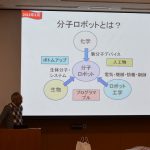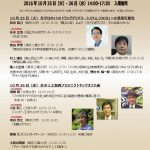CBI2018年次大会において第2回分子ロボット倫理国際会議(参加費無料)を開催します。奮ってご参加ください。
関連サイト: 分子ロボット倫理、分子ロボティクス
The 2nd International Conference on Molecular Robot Ethics
Date & Time: 9th Oct. (Tue), 2018 14:00-17:30
Place: Small Conference Room, 5th Floor, Tower-Hall Funabori, Tokyo
Molecular Robotics, an emerging interdisciplinary research field among robotics, chemistry and biology has attracted interest from the viewpoint of future technologies potentially applicable to intelligent drug delivery system and artificial muscle for cancer therapy and regenerative medicine, to name a few. This conference focuses on the ethics and technology assessment aspects of molecular robotics. The topics of interest includes comparison between molecular robotics and systems biology ethics, molecular robot guideline, responsible research and innovation and dual use issues in emergence technology, but not restricted to.
Program:
 Moderator: Ryuma Shineha (Seijo University)
Moderator: Ryuma Shineha (Seijo University)
14:00-15:30 <Molecular Robotics, ELSI and TA session>
Opening Remarks
Molecular Robotics: Its Concept, Technology and Ethics
 Akihiko Konagaya (Tokyo Institute of Technology)
Akihiko Konagaya (Tokyo Institute of Technology)
Molecular robotics enables us to develop molecule-based movable molecular robots with sensors and intelligence. Several molecular robot prototypes including intelligence drug delivery systems and artificial muscles are being developed, so far. Emergence of such molecular robots raises new research issues with regards to ethics and technology assessment. In order to cope with these issues, we firstly announce the Ethical Principles of Molecular Robotics.
Safety engineering by synthetic biology
 Daisuke Kiga (Waseda University)
Daisuke Kiga (Waseda University)
Emerging technology can pose an increased risk, but at the same time can aid in the development of safety technology. This topic has been discussed within Synthetic biology from its early days. Recently, engineering of genetic code has shown proof of concept in various containment technologies. I would like to introduce discussion in a genome synthesis conference, and to discuss future safety engineering within artificial cell research.
Designing RRI after ELSI: To whom are we responsible?
 Erika Szymanski (The University of Edinburgh, UK)
Erika Szymanski (The University of Edinburgh, UK)
15:30-16:00 Break
16:00-17:30 < Interdisciplinary Technology Assessment session>
Japanese Perspectives on Molecular Robotics: Formulating Ethical Principles of Molecular Robotics (ver. 1.1)
 Naoto Kawahara (Kyushu University)
Naoto Kawahara (Kyushu University)
In Japan, research and development of molecular robotics has been promoted, taking advantage of an important elemental technology concerning senses, motions and intelligence. More complicated configurations of systems in molecular robotics are conceivable, which will be applied to informatics, engineering, chemistry, biology and medicine in near future. In this context, I examined the related ethical principles, codes, guidelines, etc. with my research colleagues. Then, we formulated the ethical principles of Molecular Robotics (ver. 1.1).
On governing risks of emerging technologies: Exemplary cases and cautionary tales from synthetic biology
 Kenneth Oye (MIT Political Science, USA)
Kenneth Oye (MIT Political Science, USA)
To inform deliberation on prospective responsible innovation in molecular robotics, this talk will turn to analysis of best and worst historical cases.
• First, a look back at past emerging technologies finds that contemporaneous forecasts of beneficial applications and adverse effects failed. Uncertainty over the development, application, diffusion and effects of emerging technologies is pervasive.
• Second, in the presence of pervasive uncertainty, adaptive approaches to risk governance provide a superior alternative to traditional permissive and precautionary approaches, albeit with practical problems in implementation.
Illustrations will be drawn from retrospective studies on the automobile, laser and GPS and from current cases on aircraft, pharmaceuticals and synthetic biology.
Interdisciplinary technology assessment – practice and outlook for responsible molecular robotics
 Stephan Lingner (EA European Academy of Technology and Innovation Assessment, Germany)
Stephan Lingner (EA European Academy of Technology and Innovation Assessment, Germany)
The idea of Molecular Robotics is designed as a new technology with the motivation to create new options for e.g. easing human life and supporting health. The current developments are mainly put forward by scientists at the intersection between molecular biology and bioengineering. These disciplines are on one side expected to enable high-level research towards the realisation of molecular robots with ambitious capabilities. On the other side, the mentioned professions are to a large extent blind with respect to the full spectrum of societal consequences of their developments and related applications. Molecular robots needs – as any new development – for broad social acceptability and desirability in order to become a welcomed and marketable innovation. And this is the point where other professions like economics, social sciences and ethics come in to investigate and assess the chances and risks of molecular robots for society. Corresponding isolated reflections, however, dare to lose grounds by ignorance or poor understanding of the complex techno-scientific developments at stake. The reflective assessments should therefore ideally integrate the relevant bio-scientists and engineers into an interdisciplinary effort, instead.
Correspondingly, the EA European Academy developed an efficient framework for the analysis and assessment of new or emerging technologies and their potentials and government for human society. This framework has been successfully practiced since 22 years within more than 45 assessment projects (e.g. on robotics, nanotechnology and synthetic biology) for national ministries and trusts as well as for the European Commission. Basic features of this framework are: coordinated regular experts’ discourses within interdisciplinary working groups, moderate project lifetime (2-3 years), mutual acknowledgement of participating disciplines and related arguments, rational and impartial investigations, joint consent on appraisals and on recommendations for the actor’s level.
The above mentioned assessment framework will be illustrated in more detail and referred to the issue of Molecular Robotics. The talk will conclude with an outlook on possible questions for corresponding interdisciplinary investigations on this issue.
Closing Remarks
 Hideaki Shiroyama (The University of Tokyo Graduate Schools for Law and Politics, Japan)
Hideaki Shiroyama (The University of Tokyo Graduate Schools for Law and Politics, Japan)
Ethical Principles of Molecular Robotics (ver. 1.1)
分子ロボット技術倫理綱領第1.1版
(First Edition, 8th August, 2018)
(2018年3月5日作成)
(2018年8月8日案 改訂)
Preamble
Nowadays, it is an issue of extreme importance to establish an ethical framework with a new view of material, information and life according to a technological development. With ever-increasing progress in creativity and ingenuity of technology, new devices and systems appear continuously. However, there are concerns about the ethical scope of molecular robotics. In Japan, research and development of molecular robotics has been promoted, taking advantage of an important elemental technology concerning senses, motions and intelligence. More complicated configurations of systems in molecular robotics are conceivable, which will be applied to informatics, engineering, chemistry, biology and medicine in the near future. In this context, we formulate the following ethical principles. We also request any person who engages in molecular robotics to comply with these principles.
今般、技術開発の進展に伴い、新しい物質・情報・生命観を想起し、倫理の枠組みを社会の中に確立させていくことは重要な課題といえよう。 モノづくりが進化し、これまでになかったデバイスやシステムが次々と現れる一方、分子ロボット技術の倫理的課題も多岐に及ぶ。わが国の分子ロボット技術は、感覚、運動、知能が重要な要素として捉えられ、それぞれの要素技術を活かした研究開発が進められているところである。将来的に、分子ロボット技術は、より複雑な構成が実現可能になるとともに、情報学、工学、化学、生物学、そして、医学・医療などに応用されることが予想される。このような背景において、私たちは、以下の倫理綱領を定めるとともに、分子ロボット技術に携わるすべての者にその遵守を求めるものである。
Ethical Principles
1.Comprehensive assessment of risks and benefits
▶ Any person who engages in molecular robotics shall make a comprehensive assessment of potential harm for human beings or the environment as well as predicted risks and benefits. Then they shall also take measures to minimize those burdens and risks.
リスク・ベネフィットの総合評価
▶ 分子ロボット技術に携わる者は、その技術の複雑化とともに、人間・環境への負担ならびに予測されるリスク及び利益についての総合的な評価を行うとともに、それらの負担及びリスクを最小化させ得る対策を講じなければならない。
2.Consideration for safety and environment
▶ Any person who engages in molecular robotics shall take containment and safety measures for the environment. This includes ethical responsibility and consideration for future generations.
安全と環境への配慮
▶ 分子ロボット技術に携わる者は、環境への拡散防止のための措置、安全の確保に向けた取組を行う必要がある。これは、将来世代に対する責任と配慮を含む。
3. Paying attention to security and dual-use issues
▶ Any person who engages in molecular robotics shall investigate security measures in consideration of physical, personnel, transport, material, and information aspects. They shall also pay attention to dual-use issues.
セキュリティとデュアルユース問題への留意
▶ 分子ロボット技術に携わる者は、物理的・人的な観点のみならず、輸送や材料管理、情報の観点も考慮したセキュリティ対応を検討するべきである。併せて、デュアルユースに関する問題にも注意を払う必要がある。
4. Ensuring accountability and transparency
▶ Any person who engages in molecular robotics shall ensure accountability and transparency for the public good, making progress of the research and development rooted in social justice.
説明責任と透明性の担保
▶ 分子ロボット技術に携わる者は、社会正義に根ざした研究開発を進展させるにあたり、公共への説明責任と透明性を担保しなければならない。
The above principles will continue to be revised as needed.
以上、この倫理綱領は今後も必要に応じて見直していくものとする。

